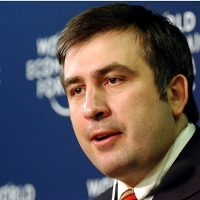The Not-So Secret Billionaire
November 28, 2011 -
Andrew Wilson
-
Bez kategorii

saakaszwili_World Economic Forum_s.jpg
Until October, next year’s parliamentary elections in Georgia looked to be a foregone conclusion. The ruling United National Movement was expected to win another healthy majority, by fair means or foul, which might then create a platform for President Mikheil Saakashvili to somehow maintain power after his two terms expire with the presidential elections due in 2013.
In October, however, Georgia’s richest man Bidzina Ivanishvili (estimated wealth $5.5 billion) declared he would enter the race, and all bets were suddenly off. Ivanishvili used to be notoriously publicity-shy, but had supported the Rose Revolution in 2003, and even bankrolled many of its early activities; topping up government and MPs’ salaries and providing the reformed police with new cars, until the budget grew strong enough to support itself. Ivanishvili is also famous for his philanthropy: most notably in his home village and town of Chorvila, where he has invested heavily in construction, hospitals and even a new swimming pool; but also nation-wide, including helping to build the massive new Holy Trinity Cathedral high above Tbilisi, which will also house the Georgian Patriarch when it is finished.
Ivanishvili had stayed in the background until last month, but claims that he broke with Saakashvili over the declaration of a state of emergency in November 2007 and what Ivanishvili says was the fixing of the last elections in 2008 – even before the disastrous war with Russia that August. More generally, Ivanishvili claims Saakashvili has gradually turned into an autocrat, whose early successes in liberalising the economy and cutting down on small-scale corruption are outweighed by his restoration of a security state and high-level corruption behind the scenes.
Ivanishvili has also condemned most of the current opposition (the Christian Democrats, New Rights) as privately in Saakashvili’s pocket, before joining forces with the old dissident Republican Party and the Free Democrats led by the former head of the Abkhazian government-in-exile, Irakli Alasania, to form a new alliance called “Georgian Dream”.
Initial attempts to establish Ivanishvili’s own party, however, have been obstructed by the government blocking possible venues. A planned launch on November 25th is now scheduled for December 11th, but with the name of the party still undecided. By then, there will be poll data on Georgian Dream – before October the Free Democrats were rating between 3 and 10 percent, after 18 percent in last year’s municipal elections in Tbilisi, while the Republicans were in low single figures.
The authorities have not reacted well. Ivanishvili has had his Georgian citizenship stripped, as he also holds a French passport (and used to have a Russian passport too); though he is appealing with the Patriarch’s support. Ivanishvili’s Cartu Bank is under threat after a raid on a cash delivery and the hasty introduction of amendments to laws on Banking and the Tax Code that would effectively put Cartu’s entire $300 million business in jeopardy. The state media has also questioned Ivanishvili’s links to Russia, where he made most of his money in the 1990s, effectively accusing him of being a Russian stooge.
But the tycoon has replied that he was never connected to the Russian state and has promised to sell off all his assets there (about one third of his total wealth) before the elections. More subtly, Saakashvili’s side has argued that charity is no basis for government, and that Ivanishvili will turn the whole country into one big Chorvila, looking for handouts and undermining the post-2003 “libertarian revolution”.
Ivanishvili has also yet to show that he can make the transition from tycoon to politician – though his outsider status may well take him far in the current global environment of anti-politics. Ivanishvili promises to create a team of experts, but is risking launching his movement before they have fleshed out his policy ideas.
Modern Georgia has a history of switching from one political Messiah to another. Nevertheless, Ivanishvili has already made a difference by making the elections competitive. His party is really a citizens’ movement: his stated priority is to clean up politics rather than enact major policy change; and he promises to provide a cooler head than the often impulsive Saakashvili. Ivanishvili has said he will maintain Georgia’s course towards NATO and the EU, without suggesting that either is just round the corner, normalise relations with Russia, and open a dialogue with the occupied territories of Abkhazia and South Ossetia. But he has yet to define his position towards more fundamental local questions: he says he is pro-market, but has said little about Saakashvili’s radical exceptionalist liberalism, other than by suggesting it is fake.
Even more intriguingly, the elections are threatening to reveal the regime’s dark repressive underbelly. Georgia does not have the Virtual Politics and Potemkin facades of Putin’s Russia. Rather it is an arena where simultaneous realities coexist: it is both democratic and repressive, nationalist and victim, with a simultaneously “liberal” and government-controlled economy. At the very least, Ivanishvili’s candidacy will bring the debate about the nature of modern Georgia into the open.
Andrew Wilson is a Senior Policy Fellow with the European Council on Foreign Relations (ECFR) and the author of Belarus: The Last European Dictatorship, published by Yale University Press.
This week in the East is a weekly commentary by Andrew Wilson for New Eastern Europe.


































